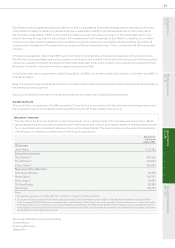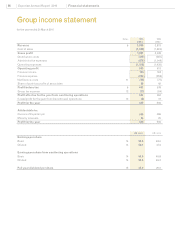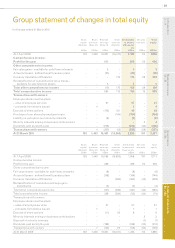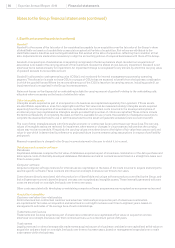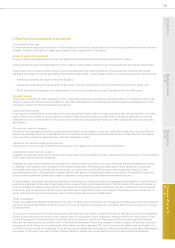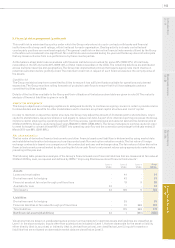Experian 2010 Annual Report Download - page 95
Download and view the complete annual report
Please find page 95 of the 2010 Experian annual report below. You can navigate through the pages in the report by either clicking on the pages listed below, or by using the keyword search tool below to find specific information within the annual report.
93
Introduction
2 – 11
Business review
12 – 51
Governance
52 – 84
Financial statements
85 – 160
4. Signicant accounting policies (continued)
Revenue recognition
Revenue represents the fair value of consideration receivable on the sale of goods and services to external customers, net of value
added tax and other sales taxes, rebates and discounts, including the provision and processing of data, subscriptions to services,
software and database customisation and development and the sale of software licences, maintenance and related consulting services.
Revenue in respect of the provision and processing of data is recognised in the year in which the service is provided. Subscription
revenues, and revenues in respect of services to be provided by an indeterminate number of acts over a specied period of time,
are recognised on a straight line basis over those periods. Customisation, development and consulting revenues are recognised
by reference to the stage of completion of the work. Revenue from software licences is recognised upon delivery. Revenue from
maintenance agreements is recognised on a straight line basis over the term of the maintenance period.
Where a single arrangement comprises a number of individual elements which are capable of operating independently of one
another, the total revenues are allocated amongst the individual elements based on an estimate of the fair value of each element.
Where the elements are not capable of operating independently, or reasonable measures of fair value for each element are not
available, total revenues are recognised on a straight line basis over the contract period.
Sales are generally invoiced in the geographic area in which the customer is located and accordingly the geographic location of
the invoicing undertaking is used as the basis for attributing revenue to individual countries.
Foreign currency translation
Transactions and balances
Transactions in foreign currencies are recorded in the functional currency of the relevant Group undertaking at the exchange
rate prevailing on the date of the transaction. At each balance sheet date, monetary assets and liabilities denominated in foreign
currencies are retranslated at the exchange rate prevailing at the balance sheet date. Translation differences on monetary items
are taken to net nance costs in the Group income statement except when deferred in equity, as qualifying net investment hedges
or cash ow hedges.
Translation differences on non-monetary available for sale nancial assets are reported as part of the fair value gains or losses in
other comprehensive income.
Group undertakings
The results and nancial position of Group undertakings whose functional currencies are not US dollars are translated into US
dollars as follows:
Assets and liabilities are translated at the closing exchange rate at the balance sheet date; -
Income and expenses are translated at the average exchange rate for the year (unless this average is not a reasonable -
approximation of the cumulative effect of the rates prevailing on the transaction dates, in which case income and expenses are
translated at the rates on the dates of the transactions); and
All resulting exchange differences are recognised as a separate component of equity. -
On consolidation, exchange differences arising from the translation of the net investment in Group undertakings whose functional currency
is not the US dollar, and of borrowings and other currency instruments, primarily foreign exchange contracts, designated as hedges of such
investments, are recognised in other comprehensive income. Tax charges and credits attributable to those exchange differences are taken
directly to other comprehensive income. When such an undertaking is sold, these exchange differences are recognised in the Group income
statement as part of the gain or loss on sale. Goodwill and fair value adjustments arising on the acquisition of such entities are treated as
assets and liabilities of the entities and are translated into US dollars at the closing exchange rate.
Discontinued operations
A discontinued operation is a component of the Group’s business that represents a separate geographic area of operation or a
separate major line of business. Classication as a discontinued operation occurs upon disposal or earlier, if the operation meets
the criteria to be classied as held for sale under IFRS 5.
Share-based payments
The Group has a number of equity settled, share-based employee incentive plans. These include awards in respect of shares in
the Company made at or after the demerger of Experian and Home Retail Group from GUS plc in October 2006, together with
awards previously made in respect of shares in GUS plc which were rolled over into awards in respect of shares in the Company
at demerger. The fair value of options and shares granted is recognised as an expense in the Group income statement on a
straight line basis over the vesting period, after taking into account the Group’s best estimate of the number of awards expected
to vest. The Group revises the vesting estimate at each balance sheet date. Non-market performance conditions are included in
the vesting estimates. Expenses are incurred over the vesting period. Fair value is measured at the date of grant using whichever
of the Black-Scholes model, Monte Carlo model and closing market price is most appropriate to the award. Market-based
performance conditions are included in the fair value measurement on grant date and are not revised for actual performance.


